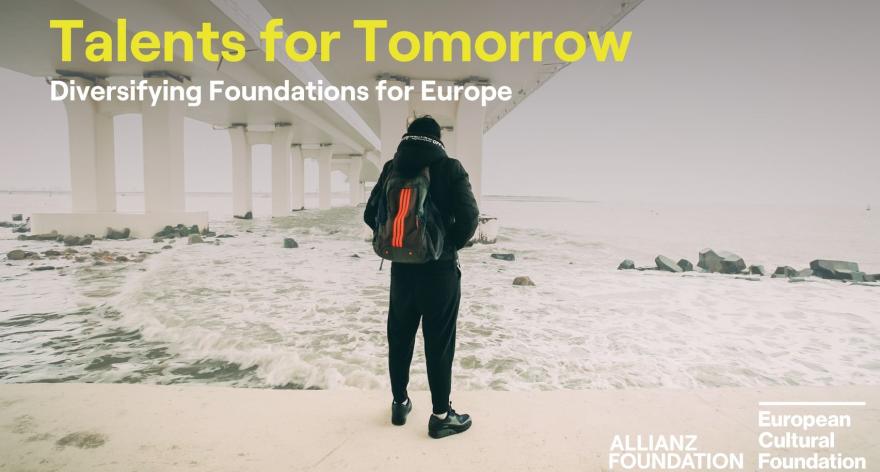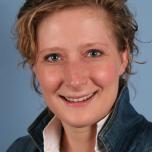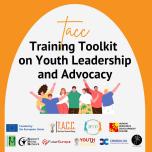Start a traineeship: The new "Talents for Tomorrow" programme of the Allianz Foundation

Interested in a traineeship in Berlin or Amsterdam?
It's important to remember that philanthropy should be in touch with society, open doors to more professional opportunities, and reflect a diversity of perspectives and experiences.
The Allianz Foundation and European Cultural Foundation have teamed up for the Talents for Tomorrow traineeship, to work towards these values. We want to make sure our teams are reflective of the European sociocultural melting pot.
That’s why we’re looking for two talented trainees. Perhaps one of them could be you! We are offering traineeships in Berlin and Amsterdam.
Important takeaways:
- It's an 8-month traineeship.
- It’s a collaboration of two philanthropy organisations.
- Both teams work to ensure a better future for Europe.
You can work in Berlin with Allianz Foundation or in Amsterdam with ECF. Apply for this chance to collaborate and learn from your counterpart, explore the world of European philanthropy, and help us work towards Europe’s future.
Apply here!
Image: ©Allianz Foundation
Stiftung Schüler Helfen Leben
Axel-Springer-Str. 40
10969 Berlin
ألمانيا
- Democracy and community development
- Gender
- Human rights
- International/Cultural relations
- Youth and education
The Foundation Schüler Helfen Leben (SHL) has around 150 members, most of which are younger than 27 years. The board consists of 12 members with an average age of 21.7 years, responsible for the strategic focus of the organization. The implementation is realized by 17 employed staff and 8 volunteers in three offices in Germany (Berlin, Lübeck, Neumünster) and 9 employees in Sarajevo (BiH).
The annual budget amounts to 2-2,5 million euros in the last three years.
The source of funding derives from private donations through the Solidarity Action Day (Sozialer Tag), the Federal Foreign Office Germany and other German and International foundations.
In Neumünster the annual German Solidarity Action Day is organized, in Lübeck so focus is on SAME, a European network of organizations which are carrying out an annual Solidarity Action Day in their countries. In Berlin we are offering seminars, and financial funding and coordination of projects with partners in Southeast Europe, Jordan, Ukraine and its neighboring countries. In Sarajevo we are offering seminars, e.g. leadership programs for young people.
With education at the core of our programmes, SHL’s mission is to empower children and youth to become active and aware citizens in a society of equal standards for all. In 30 years, SHL developed as a youth organization dedicated to supporting youth through numerous activities - education, funding, mobility, and capacity development.
Our work is tailored to the needs of children and young people, and the broad array of activities contributes to equal access to education in several ways. Examples include access to and preparation for primary education for children from Roma communities, non-formal education and cultural programmes in a number of youth centres in South Eastern Europe and Jordan, vocational training programmes, and projects that aim at making schools a more democratic and less divisive learning environment.
The scope of the work of the Foundation SHL includes Germany, South Eastern Europe (Albania, Bosnia and Herzegovina, Croatia, Kosovo, Macedonia, Montenegro and Serbia), the Middle East (Jordan and Syria) and Ukraine and its neighbouring countries (Poland and Moldova).
Since 1992, the organisation has mainly been active in the Western Balkans, having gained 25 years of experience with youth, educational and anti-discrimination projects across the region. After an initial focus on humanitarian aid, the organization has been implementing youth and education programmes in the region since the mid-90s with offices in Bosnia and Hercegovina (BiH) and Kosovo (with the Kosovo office developing into an independent organization). SHL has partnered with dozens of local grassroots institutions and holds partnerships as long-term as 12 years with individual organizations. Besides our general expertise in the region, we are the only youth-led foundation in Germany and one of very few social organizations founded and led by young people. Since 2013, SHL extended its project region and also supports projects for children and youth in Jordan and Syria who had to flee from the conflict in Syria. In 2022, SHL started emergency aid projects in the Ukraine and its neighbouring countries for youth who were affected by the Russian invasion.
As a young member based foundation, we are quite unique in the German foundation network. At the same time, we have a lot of expertise in working with young people on different levels and giving them a voice; in Germany, in Southeast Europe, in Jordan and in Ukraine. As a well-known and well accepted actor in the area of Youth Engagement in Germany and especially in Southeast Europe we can offer a wide range of networks in these regions. Furthermore, through our SAME (Solidarity Action Day in Europe)-Programme in Lübeck we are connected across Europe within a network of community philanthropy of young people. As a funding and at the same time funded organization we have knowledge for both sides of funding processes.
As we are the biggest youth-led organization in Germany we are constantly in a process of learning and improvement. Broadening your view or refocus your perspective through other organizations is one of the ways to get there. It could be through seminars, bilateral exchanges, joint projects etc.
Stiftung Shanti
Moorweg 51
13509 Berlin
ألمانيا
- Democracy and community development
The Shanti Foundation is a non-profit foundation based in Berlin. It was founded in 2019 by Dr. Christa Pandey and is dedicated to promoting human encounters in all areas of culture and the idea of international understanding.
Our guiding principle is the personal encounter, exchange and understanding. We support projects that create connection, resonance and meaning. We are effective when new relationships are established between people from different backgrounds and socialisations who would otherwise never have met. We place projects for young people in particular at the centre of our work, as we are convinced that this is where the impact is most sustainable. Supporting humanitarian projects is therefore not a direct focus of the foundation's work.
At the Shanti Foundation, we are committed to making encounters between people possible. We are talking about encounters that are new and surprising as well as encounters beyond our comfort zone.
In view of a perceived divide in many societies, our social interaction is often at the centre of daily news. It is commonplace that mutual understanding, respect and acceptance need to be strengthened. The real challenge lies in recognising and overcoming prejudices that are simply assumed and reproduced. To do this, we need situations of encounter in which people with different perspectives can come together on an equal footing. We need spaces of encounter in which people can have their own positive experiences with each other.
Testing, exploring and researching formats for encounters and contacts that are sustainable is more important than ever. We support suitable methods and tools so that people can influence and inspire each other. In order to bring people into contact in the first place, we support creative approaches to reach them.
We are a small and young foundation that would like to specialise in methods and formats of encounter in the future. Together with our project partners, we would like to become experts in formats that are effective and sustainable. There are many daily contacts and many perspectives in our societies. But we would like to ask ourselves how we can support people in not just shielding or consuming other perspectives, but taking them seriously and respecting them? Within a network that focuses on intercultural dialogue, we can contribute our experience. Every foundation and every NGO has successes, but also failures. We can learn from these instead of making the same mistakes if we know about them from each other.
We are primarily interested in exchange. We would like to share experiences, evaluations and possible scientific findings in contact research. Projects are usually selective and short-term. We rarely know whether and how they have actually worked. We hope that this knowledge will be pooled in a network without being lost.
Stiftung Wissenschaft und Politik (SWP). German Institute for International and Security Affairs
Ludwigkirchplatz 3-4
Berlin
ألمانيا
- Research
The German Institute for International and Security Affairs of the Stiftung Wissenschaft und Politik (SWP) is an independent scientific establishment that conducts policy-oriented research on the basis of which it then advises the Bundestag (the German parliament) and the federal government on foreign and security policy issues. The analyses and publications produced by SWP researchers and their participation in national and international debates on key issues help to shape opinion in their respective domains.
See homepage
Stiftung Wissensraum Europa-Mittelmeer (WEM) (Fondation Espace du savoir Europe-Méditerranée - Foundation Knowledge Space Europe-Mediterranean)
Rue Des Francais Libres
80000 Amiens Cedex
ألمانيا
- Heritage
- International/Cultural relations
- Research
- Youth and education
The WEM Foundation is a non-profit cultural and scientific organisation (association) with a managing committee of seven members from Europe, the Arab World and Subsahara Africa. All permanent staff members work in an honorary capacity. The WEM has no regular budgetary resources apart from project fundings by German cultural and scientific foundations (in 2011: € 38.000 from Fritz Thyssen Foundation and Allianz Cultural Foundation). WEM staff and WEM members organize conferences with participants from Europe, the Arab World (Maghreb) and Subsahara Africa in Germany, France, Tunisia, Morocco and (in 2013) in Senegal. Main partner of WEM is the Institut für Auslandsbeziehungen (ifa), Stuttgart und Berlin. The cooperation with other partners depend on the character of projects which are to be realized.
Exchange and partial integration of cultural knowledge of Europe, the Southern Mediterranean countries and Subsahara Africa; creation of new contents and structures of knowledge by uniting elements from the ‘North’ and the ‘South’ in a ‘Euro-Mediterranean Space of Knowledge’ where – to give an example – you cannot deal with political theory in history without mentioning Machiavelli as well as Ibn Khaldûn; a main objective of WEM is to help to develop a ‘euro-mediterranean’ consciousness of mutuality, solidarity and unity.
The WEM staff as well as WEM members organize conferences with participants from Europe, the Arab World (especially the Maghreb) and Subsahara Africa. A concrete project is a virtual map of places which incarnate the intensive cultural exchange between Europa, the Southern Mediterranean World and Subsahara Africa, for example Tangiers, Granada, Weimar, Alexandria, Timbuktu. Another project is a German/European – Arabic dictionary of cultural and political key words with commentaries on the culturally specific semantics of each word.
The WEM Foundation could help to intensify the contacts of the German ALF Network with interested persons in the southern Mediterranean area. And it could help to deepen the relations of the Network to universities and schools.
The WEM Foundation wants to join the ALF network because it wants to support the mission of the ALF Network and because it is interested in new partners to cooperate with.
StreetGriot Media Education
Boddinstrasse 42 c/o Karina Piersig
Berlin
ألمانيا
- Youth and education
StreetGriot Media Education offers courses and workshops in which youths find support for their creativity, autonomy, and courage to explore their own ideas. In our projects we create intercultural learning environments in which youths can pursue questions that are of importance to them. Children and youths in our projects work on topics that contribute to their understanding of who they are and the world in which they live, such as turning points in their lives, or political and social structures whose effects they experience in their daily lives. The basic principles of our curriculum are relevance to youths’ lives, active participation, and process orientation. In our projects we create space for applied and academic learning, for emotional and social development, and for youths’positive self-images and the assumption of responsibility on their way to adulthood. Video technology and digital media are our tools: Youths create their own film projects: they decide on and research content, acquire the necessary technological skills, and artistically express their ideas in the medium of film. They use the internet to research information on their film topics and make public interviews that they conduct in their own communities. They also use webquest learning environments designed by us to reflect on political and emotional topics such as the Israeli-Palestinian conflict.
In our courses we work on a wide range of topics which all have in common that they are oriented towards a diversity and social justice perspective. Topics addressed so far in our courses have included gender, identity, immigration, intergroup conflict, Islamophobia, and Anti-Semitism. Our basic media literacy curriculum scaffolds competencies in the areas of digital media, socio-emotional development, and language use. We come ready with our mobile media lab that includes digital cameras, microphones, tripods, and editing software, and we conduct workshops and classes tailored to each setting. Working with digital media in our projects includes more that mere “tech”-knowledge. Almost equally important are the acquisition and development of socio-emotional and language skills. In our courses on the Israeli-Palestinian conflict youths of different backgrounds have the opportunity to explore different perspectives on the conflicting parties, research information, give voice to their experiences and emotions, and understand the experiences and emotions of others. In orientation to other approaches in the field of Peace Education, this line of our work focuses on the youths’ exploration of knowledge, values, attitudes and behaviors that are necessary for a peaceful coexistence. In a series of different modules (e.g., video messages, webcasts) we focus on the critical analysis of the structural and emotional constellations that feed situations of intractable conflict, and which also influence the participants in our courses.

Swenja Zaremba
Co-Coordinator of the German network of the Anna Lindh Foundation and Project Management and Research Assistant at the ZAK | Centre for Cultural and General Studies at the Karlsruhe Institute of Technology (KIT) in Germany. She holds a Master’s Degree...

Swenja Zaremba
Co-coordinatrice du réseau allemand de la Fondation Anna Lindh et assistante en gestion de projet et de recherche au ZAK | Centre d'études culturelles et générales de l'Institut de technologie de Karlsruhe (KIT) en Allemagne. Elle est titulaire d’une maîtrise...

Take Action, Create the Change Training Toolkit
This manual has been created within the framework of TACC project “Take Action, Create the Change”, managed by the International Foundation for Y-PEER Development. It consists of three main documents: I. The theoretical part includes knowledge and information on leadership...